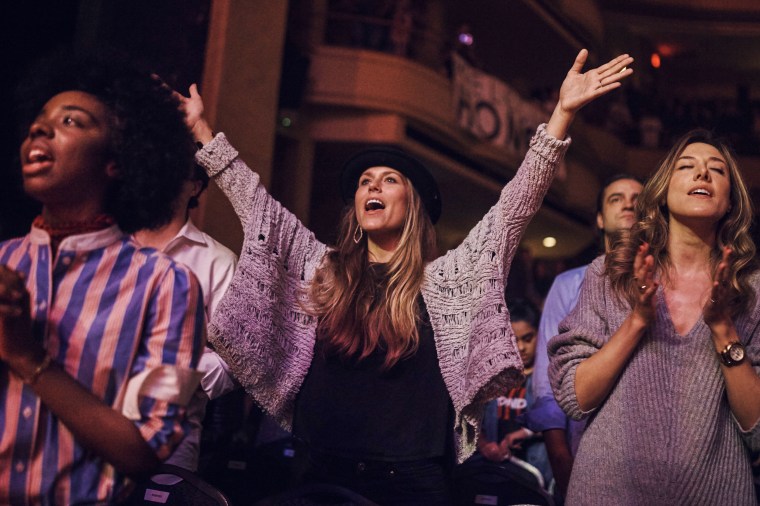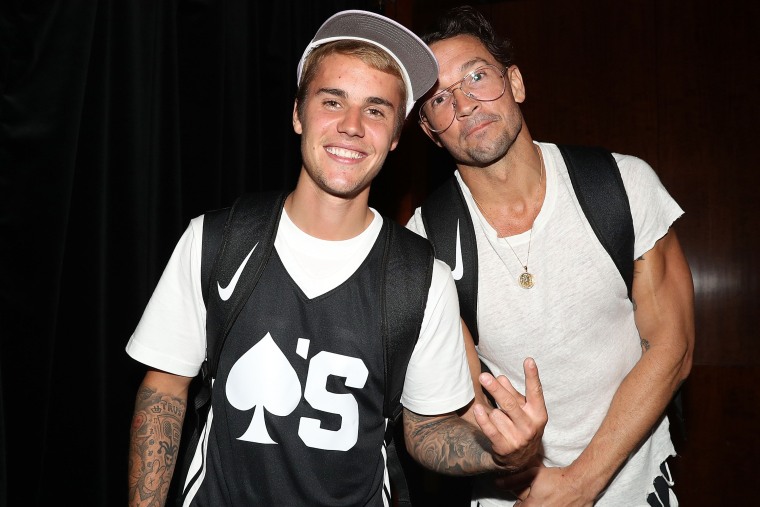Is the era of the “hypepriest” over? The ouster of pastor-turned-celebrity Carl Lentz of Hillsong NYC, the controversy and legal troubles swirling around Hillsong founder Brian Houston and a recent documentary series chronicling alleged abuse in the famously famous Hillsong Church, might certainly lead some to believe that the American public has tired of expensively dressed pastors with famous friends and large social media followings.
America's affinity for dramatic preaching, sex appeal and celebrity predates the American republic.
But while recent headlines have led to a precipitous decline in Hillsong USA churches, the celebrity pastor’s place in the United States is not under serious threat. At least not yet.
America's affinity for dramatic preaching, sex appeal and celebrity predates the American republic. George Whitefield was an actor in England before he crossed the pond and used his gifts for self-promotion and reputation for good looks to win young admirers and become the celebrity preacher of the colonies in the 1700s. Presbyterian Charles Finney’s worship spaces of the 1800s resembled theaters as much as they did sanctuaries, and he popularized “new measures” of engagement, like emotive preaching and stirring music, which entertained and revived the spiritual feelings of the faithful.
The 20th century brought enterprising American preachers new media outlets for spreading the good news. The attractiveness of the preachers — their body, voice and demeanor — often went hand in hand with their success. Hellfire and brimstone preacher Billy Sunday understood this well and had suits tailored to display his athletic physique. Women and men alike enjoyed his ultra-masculine preaching performances.
No group harnessed the power of mass media more efficiently than the Pentecostal Christian movement, which was born at the dawn of media culture in the early 20th century. From the outset, early Pentecostals felt compelled to take their miraculous good news to “the nations” before the prophesied second coming of Jesus. They quickly created newsletters and popular music that served as vehicles for their visions.
Pentecostals also created stars. The advent of new technologies like radio, film and television seemed like a divine miracle to help Pentecostal preachers reach unprecedented global audiences. While many of the biggest celebrity preachers of the past were white men, Pentecostal celebrities included a diverse group of mass media magnates like Maria Woodworth Etter, Marcelino Manuel da Graça, aka “Sweet Daddy” Grace, and Ida Bell Robinson.
Few experienced the high highs and low lows of Pentecostal celebrity like 1920s preaching sensation Aimee Semple McPherson. A transplant from Canada, McPherson moved to California and set up shop in Echo Park, a Los Angeles neighborhood known for its artistic residents. Almost a century before Lentz used bestselling Hillsong music and his friendship with pop superstar Justin Bieber to reach the masses, McPherson inspired many musicians, illustrators, actors and set designers in Hollywood to help her get her messages out to the world.

Long before Lentz drew hipsters to Hillsong NYC, McPherson attracted flappers who were dazzled by her glamorous persona and theatrical productions. While Lentz raised Joe Rogan’s eyebrows with his carefully sculpted and frequently exposed physique, McPherson wore form-fitting sequined gowns that enhanced her sex appeal. “She clings to white,” observed one sarcastic attendee, “and the fabric clings to her.”
If she were alive in the 2020s, there is no doubt she would be featured alongside Lentz on the “Preachers and Sneakers” Instagram account, which shows how a “celebrity-centric approach to Christian ministry” is often accompanied by conspicuous consumption.
Publicly, McPherson ignored her critics and showed just how much a celebrity preacher woman could accomplish in the United States. Her career survived sex scandals, a bizarre disappearance and reappearance, legal trials and church splits. She built a megachurch (Angelus Temple), established a denomination (the Foursquare Church), bought a radio station and started a Bible college.
Today, many Pentecostal and charismatic celebrities carry on this conservative political tradition.
McPherson also illustrated how celebrity preachers could shape the nation in concrete ways. She stoked American patriotism in her sermons, mobilized against Democratic gubernatorial candidate Upton Sinclair and enthusiastically promoted war bonds rallies during World War II.
Today, many Pentecostal and charismatic celebrities carry on this conservative political tradition — especially in predominately white organizations. Take one-time presidential candidate Pat Robertson, Charisma News editor and Trump prophecy promoter Steve Strang, or the many Pentecostal and charismatic worship leaders who crowded into the Oval Office for prayer and a photo op with President Donald Trump in 2019. Popular televangelists like Paula White-Cain and preacher Tony Suarez have become indispensable assets to both Trump and to conservative evangelical activism in the 21st century.
Hillsong USA’s swift rise demonstrated how a new era of digital platforms could be used to garner high-profile attendees, bring about rapid growth and shape public policy. Hillsong’s megahit “Shout to the Lord” became a mainstay on Christian radio and in charismatic and evangelical church services throughout the late 1990s and early 2000s, and Carl Lentz was just one of many young Americans who traveled to Australia to learn how to replicate the ardor and enthusiasm that they heard on Hillsong’s live worship albums. Lentz’s photogenic smile, knack for Southern Pentecostal preaching and ability to attract famous congregants made him well-suited to translate Hillsong Australia to Hillsong USA.
Brian Houston, Hillsong’s Australian founder, had a grand vision to influence the world and saw in Lentz the star power of the American celebrity preachers who had inspired him. He, too, prayed with gusto for the president at the White House in 2019, and celebrated Trump’s vision for a “strong America.” As an inheritor of that model, Lentz used his considerable platform to promote conservative sexual ethics and condemn abortion. In a move that surprised some, Lentz also supported Black Lives Matter years before other Pentecostal and charismatic celebrities like televangelist Joel Osteen marched in memory of George Floyd.
Lentz’s star rose alongside fellow well-known preachers like Chad Veach in Los Angeles and Judah Smith in Seattle, and together they gave a lot of concerned Pentecostals and charismatics hope for the future. Even though young people are trending away from Christian affiliation in the United States, media-savvy ministries seemed like they could maybe reverse that trend. Congregations full of young, beautiful people singing pop songs to God in big, culturally influential cities presented a visual rebuke of data indicating religious attendance was on the decline.
In reality, as celebrity-driven megachurches have grown larger, they have consolidated many of the Americans who still attend church (albeit much less frequently) into hubs that create Christian content in the form of music, dance and preaching for consumers around the world. Consolidating in star-driven megachurches, however, has risks and rewards. And the decline of Hillsong USA illustrates how living by jet-setting celebrity and branding also sometimes means dying by it.
No matter how far Lentz and Hillsong USA has fallen, it would be a mistake, however, to think that the American public will soon tire of celebrity-centric preachers. Ever the savvy innovators, many charismatic and Pentecostal preachers have found a market for their ministries that does not require attendance or official affiliation. The next “it” preachers with dramatic flair, catchy music and a vision for the world are attracting audiences by the million — on TikTok or Instagram or YouTube or whatever comes next.
Related
